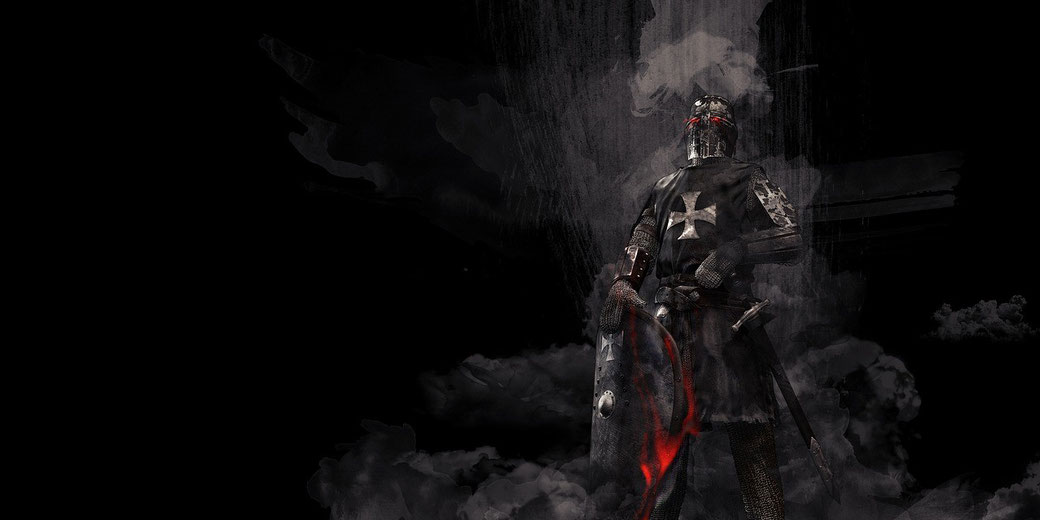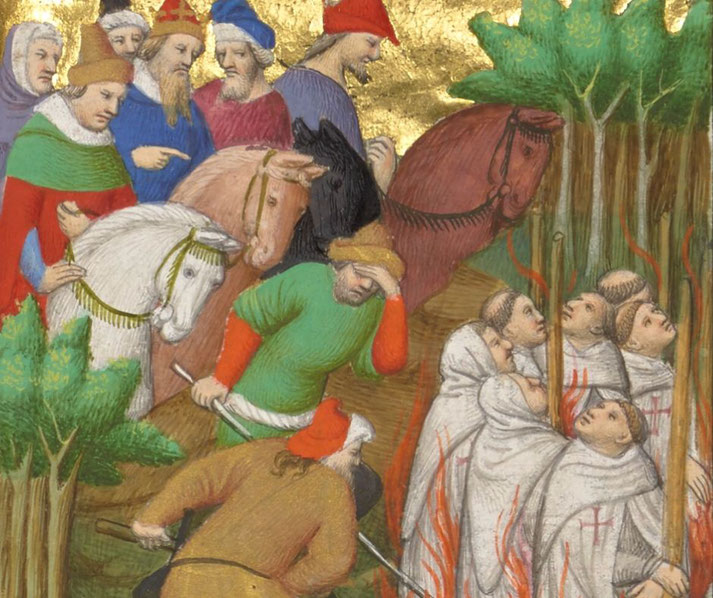The dramatic and mysterious demise of the Knights Templar

In the early fourteenth century, a powerful military order collapsed with very rapid pace, shocking rulers and church leaders across Europe.
The Knights Templar were once respected for their discipline and feared for their battlefield skill and vanished under a cloud of accusations, many of which came from the very kings who had once relied on them.
Their downfall involved secret interrogations that produced forced confessions and resulted in public executions, which all resulted in a history filled with unanswered questions.
Who were the Knights Templar?
After the success of the First Crusade and the capture of Jerusalem in 1099, Christian pilgrims began to travel to the Holy Land in large numbers, which exposed them to robbery and murder along poorly protected roads.
In response to these dangers, a small group of knights led by Hugues de Payens formed an organisation around 1119 or 1120 that would dedicate itself to the protection of Christian travellers.
According to tradition, the original membership included nine knights, though contemporary sources do not confirm this exact number.
With only a handful of men and very little wealth, they initially approached King Baldwin II of Jerusalem, who granted them quarters in a building adjacent to the Al-Aqsa Mosque, which Christians at the time believed stood on the site of Solomon’s Temple.
As a result, they became known by the name the Poor Fellow-Soldiers of Christ and of the Temple of Solomon.
At the Council of Troyes in 1129, with the support of Bernard of Clairvaux, the order received formal endorsement by the Church, which gave them spiritual authority and raised their reputation throughout Christendom.
In his treatise De Laude Novae Militiae, Bernard publicly praised their combination of religious devotion and military service.
Over the following decades, the order expanded its presence in the Holy Land and across Western Europe, where they established commanderies, acquired lands through donations, and developed a detailed internal hierarchy governed by a detailed rulebook known as the Latin Rule.
The order demanded strict discipline from its members, who took vows that bound them to poverty and chastity under strict obedience, and were forbidden from engaging in acts that would distract from their religious and military duties.
For example, members followed fixed routines, wore identical clothing, and shared meals in silence.
Because they fought in some of the most dangerous battles of the Crusades, for example, at Montgisard on 25 November 1177, when a small force of Templars fought alongside Baldwin IV, and at the defence of Acre in 1291, the Templars gained a reputation for fearlessness and military skill.
Over time, they earned the trust of monarchs, nobles, and the papacy, they began to manage estates, store treasure, collect taxes, and oversee the transfer of funds between distant cities.
Their financial operations, which allowed pilgrims to deposit money in one Templar house and withdraw it in another using letters of credit, effectively acted as a basic international banking system.
Since they answered directly to the pope and held land in every major kingdom of Europe, such as France, England and the Iberian realms, the Templars operated with a level of independence that increasingly drew suspicion from secular rulers.
Rising suspicions
After the collapse of Christian control in the Holy Land and the fall of Acre in 1291, the Templars relocated their headquarters to Cyprus, but they failed to establish a new foothold in Muslim-held territory.
Since they were unable to reclaim Jerusalem or rebuild a Crusader state, many European leaders questioned the purpose of maintaining an expensive military order with no active battlefield.
Although they continued to operate as bankers and administrators, their visibility declined, and their secrecy attracted rumours about their internal practices, particularly their initiation rites, which outsiders were not permitted to witness or discuss.
Soon, strange stories began to circulate across Europe. Some claimed that the Templars engaged in secret blasphemous rituals or idol worship, while others accused them of denying Christ and of spitting on the cross.
Some witnesses alleged the veneration of a bearded head known as Baphomet, a name that first appeared in trial records after the 1307 arrests.
As a result, public suspicion increased, even without clear proof. The great wealth and rights that the pope had granted them, including exemption from local taxes and legal jurisdiction under bulls such as Omne Datum Optimum (1139), fuelled resentment among nobles who had begun to experience financial strain.
Since they often acted as creditors to monarchs who borrowed heavily to fund wars and palaces, the Templars found themselves in a dangerous position: too powerful to be ignored but too independent to be controlled.
King Philip IV of France, who had fought expensive wars against England and confronted Pope Boniface VIII over the limits of royal authority, viewed the Templars with growing suspicion.
Earlier, he had already expelled the Jews from France in 1306 and seized their assets to replenish the royal treasury, and so he turned his attention to the Templars, whose property and income could help solve his kingdom’s financial crisis.
To justify action against them, he instructed his agents, such as Guillaume de Nogaret, to identify former Templars who might provide accusations that would allow for public trials.
Under interrogation, several disgruntled individuals made claims that they had committed heresy and idolatry and that they had behaved in morally corrupt ways.
Eventually, Pope Clement V agreed to open an investigation after receiving mounting pressure from the French court, though earlier correspondence between the pope and Philip suggests that Clement had prior knowledge of the coming actions.
Dramatic downfall
On the morning of Friday 13 October 1307, Philip’s agents carried out a coordinated raid across France, arresting scores of Templars and seizing documents, treasure and property.
Contemporary records suggest that approximately 138 were arrested in Paris alone, though hundreds more were detained across France.
Among the arrested was Grand Master Jacques de Molay, who had travelled to France seeking an audience with the pope.
Under torture, many of the prisoners had admitted to blasphemous acts during their initiation ceremonies, and these acts included spitting on the cross, denying Christ and taking part in secret rituals that defied Church doctrine.
Methods of torture included the strappado, which suspended prisoners by the arms tied behind their backs, as well as other harsh techniques commonly used by inquisitors.
At first glance, the confessions appeared consistent across multiple locations, and as a result, this gave Philip a reason for continued action.
Later that year, Pope Clement issued the papal bull Pastoralis Praeeminentiae, which ordered all Christian monarchs to arrest Templars in their territories and to freeze their assets pending investigation.
In some kingdoms, such as England and Aragon, local authorities hesitated to act on the charges, and in many cases, they released the Templars due to lack of evidence.
Meanwhile, in France, Philip maintained control over the process, and inquisitors continued to use torture to extract further admissions of guilt.
Despite multiple withdrawals by the accused, the French king insisted that the confessions proved the existence of a heretical conspiracy.
During the Council of Vienne in 1312, Clement announced the suppression of the Knights Templar through the bull Vox in excelso, claiming that the scandal and suspicion surrounding the order had become too damaging to the Church’s reputation, even though the decree did not pronounce the order heretical.
The decree also ordered the transfer of most of their property to the Hospitallers.
In practice, local lords and monarchs, who had claimed much of the land for themselves, ignored the pope’s instructions.
Two years later, on 18 March 1314, according to most contemporary sources, Jacques de Molay and several other senior Templars were burned alive on the Île de la Cité in Paris after they had retracted their confessions and had declared their innocence before a crowd of onlookers.
According to some chroniclers, such as Geoffroi de Paris, de Molay called upon divine justice to punish those responsible for the false charges, a statement that fuelled later legends about curses and divine retribution.
His death ended the order as a formal institution. Still, the secrecy surrounding their trials ensured that their story would continue to provoke fascination for generations.

What happened to the Templars?
After their dissolution, the fate of the surviving Templars varied across Europe. In some regions, such as Portugal, the authorities allowed former members to join new military orders that performed similar roles.
King Dinis of Portugal created the Order of Christ in 1319, which received papal recognition under the bull Ad ea ex quibus and absorbed many former Templar knights.
As a result, their traditions and knowledge continued in a different form. In Scotland, where papal authority had weakened during the wars of independence, Templars reportedly escaped prosecution and disappeared from public records, which encouraged the development of later myths about their involvement in events such as the Battle of Bannockburn, though no historical evidence supports this claim.
Elsewhere, most Templars either retired into private life or entered other monastic institutions under supervision, and their wealth had slowly merged with other ecclesiastical and royal assets.
Former members were not excommunicated and could reintegrate into religious life without formal penalty.
However, the order’s central archives and internal records, which might have clarified many accusations, disappeared after the arrests, although some regional documents have survived in places such as Aragon and Portugal.
Historians, therefore, have relied on surviving trial transcripts, inquisitorial records, and papal correspondence.
During the early modern period, writers began to speculate about hidden Templar treasure and secret knowledge and to imagine their survival in underground networks.
By the eighteenth century, some strands of Freemasonry claimed spiritual descent from the Templars, citing texts such as the Larmenius Charter.
In the nineteenth century, Romantic historians and novelists exaggerated these connections.
Eventually, the Templars turned into figures of legend rather than history. In modern times, conspiracy theories have flourished, and the order’s mysterious end continues to appear in books, films, and television.
The Chinon Parchment, which was discovered in 2001 and which came from the Vatican archives dated 17-20 August 1308 and which was publicly released in 2007, showed that Pope Clement had privately absolved the Templar leaders of heresy.
Signed by three papal inquisitors, it indicated that the papacy did not believe the accusations.
Still, the political pressure from Philip IV made it impossible for the pope to defend the order publicly.
In historical terms, the Templars’ destruction came not from theological error but from the clash of royal aims driven by debt, a papacy weakened by political pressure, and widespread envy.
Their sudden disappearance from public life, followed by centuries of speculation, ensured that their demise became one of the most debated mysteries of medieval Europe.
What do you need help with?
Download ready-to-use digital learning resources
Copyright © History Skills 2014-2025.
Contact via email
With the exception of links to external sites, some historical sources and extracts from specific publications, all content on this website is copyrighted by History Skills. This content may not be copied, republished or redistributed without written permission from the website creator. Please use the Contact page to obtain relevant permission.





